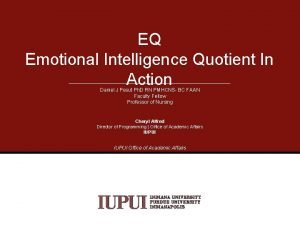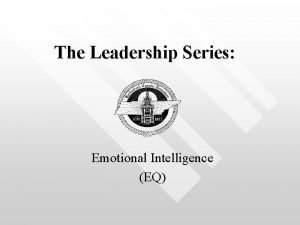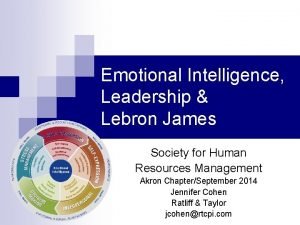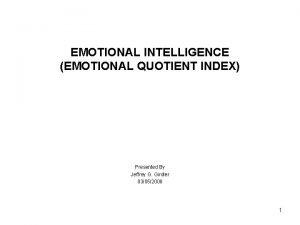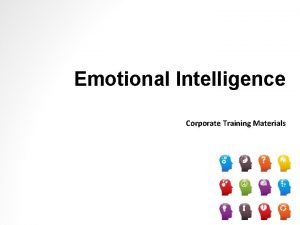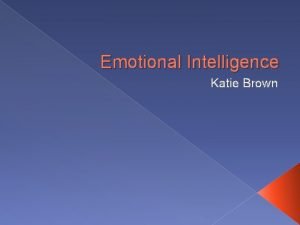EMOTIONAL INTELLIGENCE MARILYN LARA DEFINITION OF EMOTIONAL INTELLIGENCE









- Slides: 9

EMOTIONAL INTELLIGENCE MARILYN LARA

DEFINITION OF EMOTIONAL INTELLIGENCE Emotional Intelligence is the ability to manage internal and external stress. By having an innate sense to identify and understand one’s emotions, an individual can interact in a more positive, confident manner with others. When a person has a high “EQ”, they possess a quality of compassion which allows them to understand empathize with others. This is an important quality in the development of a good leader because it enables the reduction in conflict and increases effective communication. It can also impact a person’s daily life by reducing stress which leads to better health and better relationships. (http: //www. helpguide. org/articles/emotional-health/emotional-intelligence-eq. htm)

COMPONENTS OF EMOTIONAL INTELLIGENCE Goleman, D. (2011). Leadership: The Power of Emotional Intelligence, Massachusetts: More Than Sound LLC.

EMOTIONAL INTELLIGENCE CONSISTS OF FOUR ATTRIBUTES: Self-awareness – Recognizing emotions and how they affect thoughts and behavior, identifying personal strengths and weaknesses; self-confidence. Self-management – Ability to control impulsive feelings and behaviors, managing emotions in healthy, positive means, taking initiative, keeping commitments, and adapting to change Social awareness –Understanding the emotional needs of others, recognizing emotional cues, ease in social settings, and awareness of the dynamics in a group Relationship management – Maintaining good relationships, clear communication, positive influence, teamwork (http: //www. helpguide. org/articles/emotional-health/emotional-intelligence-eq. htm)

HOW TO ENHANCE EMOTIONAL INTELLIGENCE Don’t avoid feelings Notice and think through feelings before dismissing them Become aware and reduce stress Connect feelings to past experiences Connect feelings with your thoughts Use humor to deal with the situation Listen to your body Be aware of unconscious feelings Journal your thoughts Stop and get outside of your thoughts

DEFINITION OF EFFECTIVE COMMUNICATION Effective Communication is “the process of conveying feelings, attitude, facts, beliefs, and ideas between individuals, either verbally or nonverbally”(Walker, 2013, p. 200). It can improve relationships by increasing your connections to others. It reduces conflict and stress. Effective communication combines verbal and nonverbal skills, attentive listening, the ability to manage stress in the moment, and the capacity to recognize and understand your own emotions and those of the person you’re communicating with. http: //www. helpguide. org/articles/relationships/effectivecommunication. htm

HOW TO ENHANCE EFFECTIVE COMMUNICATION Eye contact Focus on the other person Pay attention to the nonverbal cues Attentive listening Possess a strong, self-concept Send messages that are clear both verbally and nonverbally

BENEFITS OF A HIGH “EQ” AND EFFECTIVE COMMUNCIATION Increased self confidence Better relationships Reduced stress Potential for job growth Improved leadership capabilities Improved self management Positive personal effectiveness Reduced interpersonal conflict

REFERENCES (Goleman, 2012) Goleman, D. (2011). Leadership: The Power of Emotional Intelligence, Massachusetts: More Than Sound LLC. Walker, V. (2013). Becoming aware: A text/workbook for human relations and personal adjustment (12 th ed. ). Dubuque, IA: Kendall Hunt Pub. (https: //www. psychologytoday. com/blog/your-mind-your-body/201201/10 -ways-enhanceyour-emotional-intelligence) ( http: //www. helpguide. org/articles/relationships/effective-communication. htm)
 Por eso estamos aquí lara lara
Por eso estamos aquí lara lara Emotional intelligence definition
Emotional intelligence definition Ihhp eq test
Ihhp eq test Oka emotional intelligence
Oka emotional intelligence Global leadership foundation emotional intelligence test
Global leadership foundation emotional intelligence test Master aptitude
Master aptitude Emotional intelligence index
Emotional intelligence index Emotional intelligence happiness
Emotional intelligence happiness Emotional intelligence flowchart
Emotional intelligence flowchart Emotional intelligence training materials
Emotional intelligence training materials

